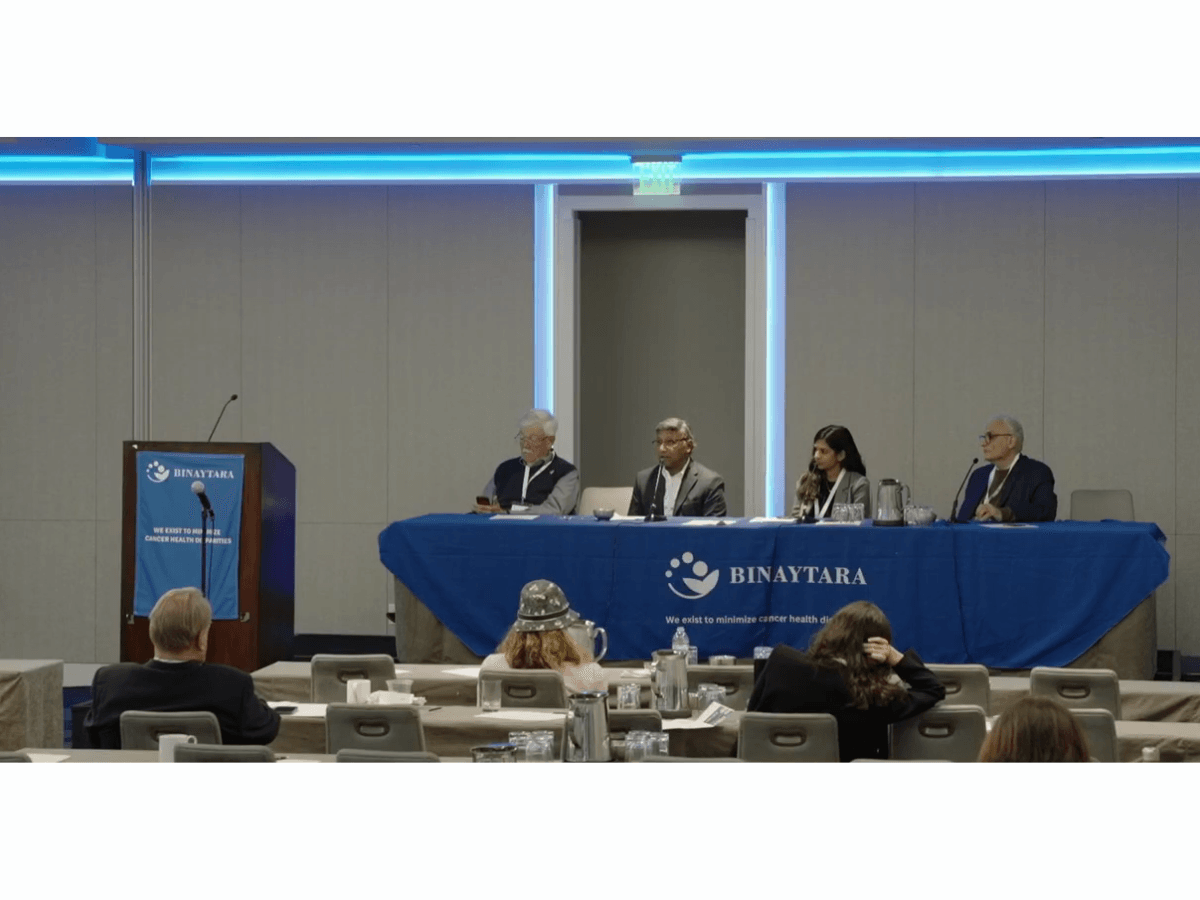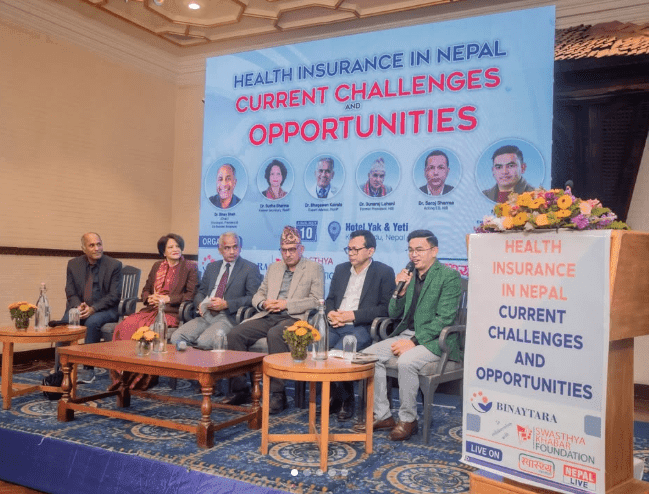
The Cancer News
AN AUTHORITATIVE RESOURCE FOR EVERYTHING ABOUT CANCER
Binaytara Nepal Healthcare Policy Debate

Executive Summary
On March 10, 2025, Binaytara, in collaboration with Swasthya Khabar, convened a multi-stakeholder advocacy dialogue to address the challenges and opportunities within Nepal’s health insurance system. The event brought together healthcare policymakers, government officials, political leaders, patient advocates, healthcare providers, civil society, and media representatives.
The dialogue began with remarks and presentations by Mr. Hari Tiwari, Country Director of Binaytara; Mr. Justin Marquart, Chief Development Officer; and Dr. Binay Shah, President of Binaytara. They outlined the organization’s mission and the current landscape of health insurance in Nepal.
The main discussion session was chaired by Dr. Shah and moderated by Mr. Dhan Bahadur Khadka, Communication Officer at Binaytara and Executive Editor of Swasthya Khabar. A distinguished panel of national experts shared their insights and recommendations on the Nepal health insurance system. The panel included:
- Dr. Sudha Sharma, Obstetrician-Gynecologist and Former Health Secretary
- Dr. Bhagawan Koirala, Cardiothoracic Surgeon and Advisor, Ministry of Health and Population
- Dr. Gunaraj Lohani, Former Chairman, Health Insurance Board
- Dr. Saroj Sharma, Chief, Quality Standard and Regulation Division, Ministry of Health and Population
Key recommendations included:
- Improving enrollment in health insurance to broaden coverage
- Consolidating fragmented schemes into a unified national insurance program
- Restructuring premiums and engaging the private sector to enhance sustainability
- Strengthening regulatory oversight and fraud prevention mechanisms
- Digitizing operations and improving internal management systems
- Enhancing public hospital capacity and ensuring timely reimbursement to providers
- Prioritizing preventive care alongside curative services
- Offering tiered insurance packages tailored to different population needs
- Implementing regular audits and monitoring for transparency and accountability
- Providing ongoing training for healthcare providers on insurance protocols
Health Secretary Dr. Bikash Devkota concluded the session by reaffirming the government's commitment to strengthening the health insurance system, improving accountability, and expanding access through increased public investment and robust program design. The session was broadcast live on national television and streamed via the Facebook pages of NepalLive and Swasthya Khabar, reaching a combined audience of over 1.7 million followers, significantly amplifying the dialogue’s visibility and impact.
Objectives:
- Evaluate the current challenges in Nepal's health insurance system, including coverage gaps, affordability, and integration of public and private schemes, to identify areas for policy improvement.
- Develop evidence-based strategies and recommendations to enhance the accessibility and sustainability of health insurance programs in Nepal, focusing on equity and the needs of underserved populations.
- Facilitate interdisciplinary collaboration among stakeholders, including policymakers, healthcare providers, and patient advocates, to drive actionable reforms in health insurance systems and improve healthcare access and outcomes in Nepal.
Overview
The advocacy dialogue was structured into two segments. The first session served as an introduction, offering attendees a contextual understanding of Binaytara’s mission and the current state of health insurance in Nepal. The second session focused on the core dialogue and policy discussions.
Session I: Introductory Session
The first part of the event set the stage for the advocacy dialogue by providing an overview of Binaytara’s mission and the current state of health insurance in Nepal.
Welcome Remarks
Mr. Hari Tiwari, Country Director, Binaytara Mr. Tiwari welcomed attendees and emphasized the importance of the dialogue in addressing affordability, accessibility, and coverage gaps in Nepal’s health insurance system. He highlighted the goal of generating actionable insights and shared that a post-event report would guide future efforts by policymakers and stakeholders.
Binaytara Overview
Mr. Justin Marquart, Chief Development Officer, Binaytara Mr. Marquart provided a brief overview of the organization’s work in expanding access to cancer care, training healthcare providers, and advancing oncology research in low-resource settings. He introduced the Binaytara’s upcoming 200-bed cancer hospital in Janakpur, which is expected to serve over 20,000 patients annually and play a key role in closing the cancer care gap in Nepal.
Health Insurance in Nepal – Challenges, Opportunities, and a Call to Action
Dr. Binay Shah, Co-founder and President, Binaytara Dr. Shah delivered a compelling presentation that emphasized the urgent need to reform Nepal’s national health insurance system to ensure equitable access to cancer care and other critical health services. Drawing on data, policy insights, and frontline experience, Dr. Shah outlined the systemic barriers currently impeding the effectiveness of health insurance across Nepal, especially in underserved regions.
Key Challenges Identified:
- Limited Coverage in High-Need Areas: Provinces such as Madhesh, Karnali, and Sudurpaschim continue to experience low enrollment in health insurance schemes. A significant portion of the population in these areas remains uninsured, severely limiting access to timely and essential treatment.
- Insufficient Private Sector Engagement: The current system lacks mechanisms to effectively integrate private hospitals and practitioners, narrowing provider options and limiting specialized care access, especially for non-urban populations.
- Financial Sustainability Concerns: According to a 2024 Asian Development Bank study, the national insurance program is struggling with funding shortfalls and operational inefficiencies that threaten its long-term viability.
- Operational Inefficiencies and Delays: Hospitals face substantial delays in claims processing and reimbursements, which not only burden healthcare institutions but also delay patient care. Additionally, the minimal use of digital tools and health IT infrastructure hampers transparency and speed.
Opportunities for Reform:
Dr. Shah emphasized that these challenges also present opportunities for transformative change. He advocated for:
- Improving enrollment and awareness across provinces
- Expanding provider networks to include high-quality private care
- Streamlining administrative processes through digitization
- Restructuring the financial model to improve sustainability and fairness
Beyond Policy – A Deeper Perspective:
Moving beyond technical discussions, Dr. Shah offered a personal and philosophical reflection on the** purpose of healthcare leadership and public service**. He reminded attendees that the ultimate goal of any health system is to alleviate people’s suffering and improve their quality of life. He shared that true impact is not measured solely in statistics, but in the stories of individuals who gain a second chance because systems work as they should.
"Our work is not just about policies and institutions. It is about people. Every effort—whether in hospitals, ministries, or communities—can create ripple effects of hope. A meaningful life is one committed to service, integrity, and the collective good."
Dr. Shah closed his remarks by urging everyone, from policymakers to practitioners, to see themselves as agents of change and to act with urgency, compassion, and purpose. He called for sustained collaboration to build a more inclusive, efficient, and people-centered health insurance system in Nepal.
Session I: Panel Discussion
Chair's Remarks
Dr. Shah opened the session by emphasizing the importance of strengthening Nepal’s health insurance system to reduce inequalities and improve access, particularly in underserved regions. He expressed support for the Health Insurance Board’s stated commitment to achieving Universal Health Coverage by 2030, but noted significant gaps remain, particularly in provinces like Madhesh, Karnali, and Sudurpaschim, where health outcomes continue to lag. He pointed out that while private and independent providers offer broader services than the public sector, many of these services are not covered by insurance. Dr. Shah relayed to the audience that a robust, inclusive insurance system could serve as a powerful mechanism to address existing gaps and improve equity in the healthcare system.
Key Insights from the Panelists
Dr. Gunaraj Lohani
Dr. Lohani discussed the behavioral shift encouraged by health insurance, with patients becoming more proactive and informed about their health. He proposed several structural reforms:
- Formal Sector First: Health insurance should begin with the formal sector, where income-based premiums can be applied, before expanding to informal sectors.
- Premium Revision: He proposed raising the current NPR 3,500 premium to NPR 8,000—split between public and government contributions—to ensure financial sustainability.
- Private Sector Integration: Allowing private providers to operate as insurance consultants could strengthen the system and generate savings for the government.
- Eliminating Redundancies: Overlapping programs such as the Social Security Fund and Citizen Investment Fund should be merged with health insurance to improve efficiency and coherence.
Dr. Bhagawan Koirala
Dr. Koirala reaffirmed the necessity of health insurance based on global evidence. He acknowledged early challenges in Nepal’s implementation but stressed that setbacks should not be mistaken for failure.
- Mandatory Enrollment: He advocated for making health insurance mandatory, questioning why civil servants, police, military personnel, and children remain under separate benefit programs.
- Resource Integration: By pooling resources from various schemes, a unified fund of approximately NPR 95 billion could be created, sufficient to sustain substantial benefit packages.
- Call for Political Will: Dr. Koirala called on political leaders, parties, and government agencies to unify efforts and prioritize national-level insurance reform.
- Addressing Non-payment: With 70% of insured individuals not paying premiums, he urged for systemic accountability and broader community engagement.
Dr. Saroj Sharma
Dr. Sharma provided a current status update from the Health Insurance Board:
- Enrollment & Utilization: About 31% of the population is insured, with nearly half actively utilizing services. Gandaki Province leads with over 50% enrollment.
- Rising Financial Burden: Increased enrollment and growing service use have outpaced budget allocations, with the Board now facing monthly expenditures of NPR 2 billion.
- Operational Limitations: The Board’s capacity to process claims (5,000/day) is dwarfed by current submissions (~40,000/day), necessitating urgent workforce expansion and organizational reform.
- Revenue Solutions: He recommended increasing premiums and introducing earmarked taxes on tobacco, alcohol, and sugary products to strengthen the insurance fund.
- Adverse Selection: The trend of individuals enrolling only when ill poses a significant threat to system sustainability, calling for better enforcement and awareness.
Dr. Sudha Sharma
Dr. Sharma offered a critical appraisal of the system, highlighting gaps in implementation and missed opportunities for improvement:
- Policy Disconnect: She expressed disappointment that expert recommendations, including her own, had been excluded from recent policy submissions to the Prime Minister.
- Misuse of Coverage: Citizens are paying for insurance but also accessing care meant to be free under the Constitution. She proposed stricter gatekeeping, where local facilities handle basic care and insurance only covers referred cases.
- Duplication of Efforts: Programs like the Social Security Fund duplicate insurance roles and should be consolidated for efficiency.
- Fraud Prevention: Dr. Sharma called for tighter enforcement of treatment protocols and penalties for physicians who deviate without justification. She proposed strengthening the Medical Council’s authority to suspend licenses for unethical practices.
- Empowering the Board: She emphasized the need for the Health Insurance Board to have stronger regulatory authority, including the power to revoke institutional participation in the scheme for malpractice or fraud.
Closing Remarks
Dr. Bikash Devkota, newly appointed Health Secretary of the Ministry of Health and Population, concluded the session by addressing core issues affecting Nepal’s health insurance system.
- Clarifying the Purpose: Dr. Devkota emphasized that health insurance is a social protection tool intended to support treatment, not routine checkups or wellness visits. He noted that misuse of insurance for non-evidence-based health screenings undermines its sustainability.
- Premiums and Accountability: He highlighted inefficiencies and a lack of accountability in the current premium payment structure, where various government entities contribute without clear oversight. He called for greater transparency in pooled funds, strengthened accountability mechanisms, and modernization through real-time digitization—especially in claims management.
- Systemic Weaknesses: Dr. Devkota pointed to internal management gaps, underutilized laws, and limited hospital capacity as major obstacles to service delivery. He urged stronger enforcement of existing regulations instead of introducing new ones.
- Procurement and Cost Duplication: Approximately 30% duplication in medicine procurement was identified as a drain on resources. He called for eliminating inefficiencies and strengthening oversight.
- Support for Reform: Dr. Devkota backed the idea of differentiated insurance packages (e.g., NPR 3,500 / 5,000 / 10,000) covering various levels of services and expressed support for revising premium structures and funding models.
- Future Outlook: He shared that the government currently allocates NPR 7.5 billion for health insurance, with a new ceiling of NPR 10 billion. He acknowledged this would still be insufficient and committed to exploring long-term solutions for financial sustainability. The health insurance report, he added, will be made public soon.
Audience Q&A and Reflections
During the interactive Q&A session, healthcare professionals, journalists, legal experts, and municipal leaders raised thoughtful questions and concerns, offering valuable insights into the real-world challenges of Nepal’s health insurance system. Highlights included:
Dr. Bhuwan Raj Giri (Himal Hospital)
- Questioned whether policymakers themselves are enrolled in health insurance.
- Noted that both providers and recipients are dissatisfied, with weakened gatekeeping mechanisms.
Mr. Shivahari Ghimire (Naya Patrika)
- Encouraged greater transparency and timely dissemination of the expert report on health insurance to reduce confusion among patients and providers.
- Emphasized the importance of aligning government investments with visible improvements in service delivery.
Mr. Buddhi Katel (Medical Patra)
- Raised concerns about unpaid dues, out-of-pocket payments by 48% of the population, and lack of service delivery despite promised coverage.
- Called for clarity on government contributions to the insurance pool.
Mr. Bhim Bahadur Chanda (Private Medical Association)
- Highlighted unpaid claims to private medical colleges exceeding NPR 3 billion.
- Requested assurance from the government to settle insurance and COVID-related dues.
Mr. Homkanta Chaulagain (Lawyer)
- Highlighted the need to strengthen the autonomy of the Health Insurance Board through adequate budget allocation and workforce support.
- Emphasized the importance of collaborative accountability among politicians and bureaucrats to ensure effective implementation.
Mr. Bishnu Lamichhane (Dakshinkali Municipality)
- Presented local data showing high utilization among elderly patients.
- Called for better monitoring to prevent fraud and duplicate tests under referrals.
- Encouraged reflection on whether the current system is geared toward comprehensive health promotion or focused primarily on illness treatment, and emphasized the need to align health insurance with preventive care principles.
Dr. Mahendra Pandey (Tokha Municipality)
- Stressed the gap between policy and practice in primary healthcare.
- Noted the absence of training for new healthcare workers as a barrier to effective implementation.
The panelists discussed and addressed these concerns throughout the session.
Conclusion
The advocacy dialogue underscored the key areas for strengthening Nepal’s health insurance system and cancer care delivery:
- Premium Adjustment: Increase premiums to ensure sustainability and expand coverage.
- Program Integration: Consolidate overlapping health programs to optimize resources.
- Digital Efficiency: Leverage technology to streamline claims and enhance transparency.
- Regulatory Strengthening: Enforce legal frameworks to prevent fraud and ensure accountability.
- Expanded Coverage: Promote broader enrollment through targeted awareness, incentives, and improved accessibility across all sectors.
Share Article

